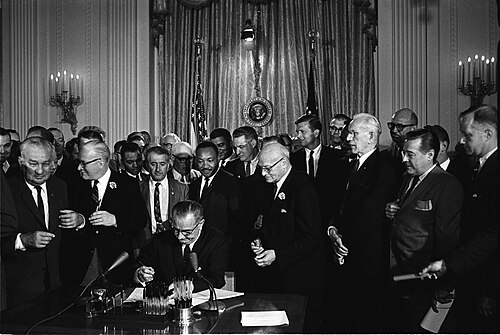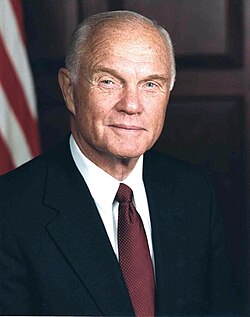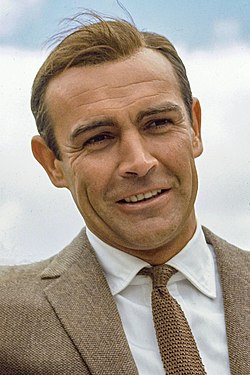Portal:1960s
The 1960s Portal
The 1960s became synonymous with the new, radical, and subversive events and trends of the period. In Africa the 1960s was a period of radical political change as 32 countries gained independence from their European colonial rulers. Some commentators have seen in this era a classical Jungian nightmare cycle, where a rigid culture, unable to contain the demands for greater individual freedom, broke free of the social constraints of the previous age through extreme deviation from the norm. Christopher Booker charts the rise, success, fall/nightmare and explosion in the London scene of the 1960s. However, this alone does not explain the mass nature of the phenomenon. Several nations such as the U.S., France, Germany and Britain turned to the left in the early and mid 1960s. In the United States, John F. Kennedy, a Keynesian and staunch anti-communist, pushed for social reforms. His assassination in 1963 was a stunning shock. Liberal reforms were finally passed under Lyndon B. Johnson including civil rights for African Americans and healthcare for the elderly and the poor. Despite his large-scale Great Society programs, Johnson was increasingly reviled by the New Left at home and abroad. The heavy-handed American role in the Vietnam War outraged student protestors across the globe, as they found peasant rebellion typified by Ho Chi Minh and Che Guevara more appealing. Italy formed its first left-of-center government in March 1962 with a coalition of Christian Democrats, Social Democrats, and moderate Republicans. Socialists joined the ruling block in December 1963. In Britain, the Labour Party gained power in 1964. In Brazil, João Goulart became president after Jânio Quadros resigned. This is a Featured article, which represents some of the best content on English Wikipedia..
"Daisy", sometimes referred to as "Daisy Girl" or "Peace, Little Girl", is a controversial American political advertisement that aired on television as part of Lyndon B. Johnson's 1964 presidential campaign. Though aired only once, it is considered one of the most important factors in Johnson's landslide victory over the Republican Party's candidate, Barry Goldwater, and a turning point in political and advertising history. A partnership between the Doyle Dane Bernbach agency and Tony Schwartz, the "Daisy" advertisement was designed to broadcast Johnson's anti-war and anti-nuclear positions. Goldwater was against the Nuclear Test Ban Treaty and suggested the use of nuclear weapons in the Vietnam War, if necessary. The Johnson campaign used Goldwater's speeches to imply he would wage a nuclear war. The commercial begins with three-year-old Monique Corzilius standing in a meadow, picking the petals of a daisy as she counts from one to ten incorrectly. After she reaches "nine", she pauses, and a booming male voice is heard counting the numbers backward from "ten", in a manner similar to the start of a missile launch countdown. A zoom of the video still concentrates on the girl's right eye until her pupil fills the screen, which is then replaced by the flash and sound of a nuclear explosion. A voice-over by Johnson states emphatically: (Full article...) This is a Good article, an article that meets a core set of high editorial standards.
Abbey Road is the eleventh studio album by the English rock band the Beatles, released on 26 September 1969, by Apple Records. It is the last album the group recorded, although Let It Be (1970) was the last album completed before the band's break-up in April 1970. It was mostly recorded in April, July, and August 1969, and topped the record charts in both the United States and the United Kingdom. A double A-side single from the album, "Something" / "Come Together", was released in October, which also topped the charts in the US. Abbey Road incorporates styles such as rock, pop, blues, and progressive rock, and makes prominent use of the Moog synthesiser and guitar played through a Leslie speaker unit. It is also notable for having a long medley of songs on side two that have subsequently been covered as one suite by other notable artists. The album was recorded in a more collegial atmosphere than the Get Back / Let It Be sessions earlier in the year, but there were still significant confrontations within the band, particularly over Paul McCartney's song "Maxwell's Silver Hammer", and John Lennon did not perform on several tracks. By the time the album was released, Lennon had left the group, though this was not publicly announced until McCartney also quit the following year. (Full article...) Selected picture - United States President Lyndon B. Johnson (seated) signs the Civil Rights Act of 1964, a landmark piece of legislation that outlawed racial segregation in schools, public places, and employment. Among the guests behind him is Martin Luther King Jr. (directly behind and to the right of Johnson).
Did you know -
Related portalsThis is a Featured article, which represents some of the best content on English Wikipedia..
John Herschel Glenn Jr. (July 18, 1921 – December 8, 2016) was an American Marine Corps aviator, astronaut, businessman, and politician. He was the third American in space and the first to orbit the Earth, circling it three times in 1962. Following his retirement from NASA, he served from 1974 to 1999 as a U.S. Senator from Ohio; in 1998, he flew into space again at the age of 77. Before joining NASA, Glenn was a distinguished fighter pilot in World War II, the Chinese Civil War, and the Korean War. He shot down three MiG-15s and was awarded six Distinguished Flying Crosses and eighteen Air Medals. In 1957, he made the first supersonic transcontinental flight across the United States. His on-board camera took the first continuous, panoramic photograph of the United States. (Full article...) This is a Good article, an article that meets a core set of high editorial standards.
Stanley Kubrick (/ˈkuːbrɪk/; July 26, 1928 – March 7, 1999) was an American filmmaker and photographer. Widely considered one of the greatest filmmakers of all time, his films were nearly all film adaptations of novels or short stories, spanning a number of genres and gaining recognition for their intense attention to detail, innovative cinematography, extensive set design, and dark humor. Born in New York City, Kubrick was an average school student but displayed a keen interest in literature, photography, and film from a young age; he began to teach himself film producing and directing after graduating from high school. After working as a photographer for Look magazine in the late 1940s and early 1950s, he began making low-budget short films and made his first major Hollywood film, The Killing, for United Artists in 1956. This was followed by two collaborations with Kirk Douglas: the anti-war film Paths of Glory (1957) and the historical epic film Spartacus (1960). (Full article...) Selected article -Sir Thomas Sean Connery (25 August 1930 – 31 October 2020) was a Scottish actor. He was the first actor to portray the fictional British secret agent James Bond in motion pictures, starring in seven Bond films between 1962 and 1983. Connery originated the role in Dr. No (1962) and continued starring as Bond in the Eon Productions films From Russia with Love (1963), Goldfinger (1964), Thunderball (1965), You Only Live Twice (1967) and Diamonds Are Forever (1971). Connery made his final appearance in the franchise in Never Say Never Again (1983), a non-Eon-produced Bond film. Connery is also known for his work with directors such as Alfred Hitchcock, Sidney Lumet and John Huston. Their films in which Connery appeared included Marnie (1964), The Hill (1965), The Offence (1973), Murder on the Orient Express (1974) and The Man Who Would Be King (1975). He also acted in Robin and Marian (1976), A Bridge Too Far (1977), Time Bandits (1981), Highlander (1986), The Name of the Rose (1986), Indiana Jones and the Last Crusade (1989), The Hunt for Red October (1990), Dragonheart (1996), The Rock (1996) and Finding Forrester (2000). His final on-screen role was as Allan Quatermain in The League of Extraordinary Gentlemen (2003). (Full article...) More Did you know (auto generated)
TopicsCategoriesWikiProjects
Associated WikimediaThe following Wikimedia Foundation sister projects provide more on this subject:
Discover Wikipedia using portals |





























